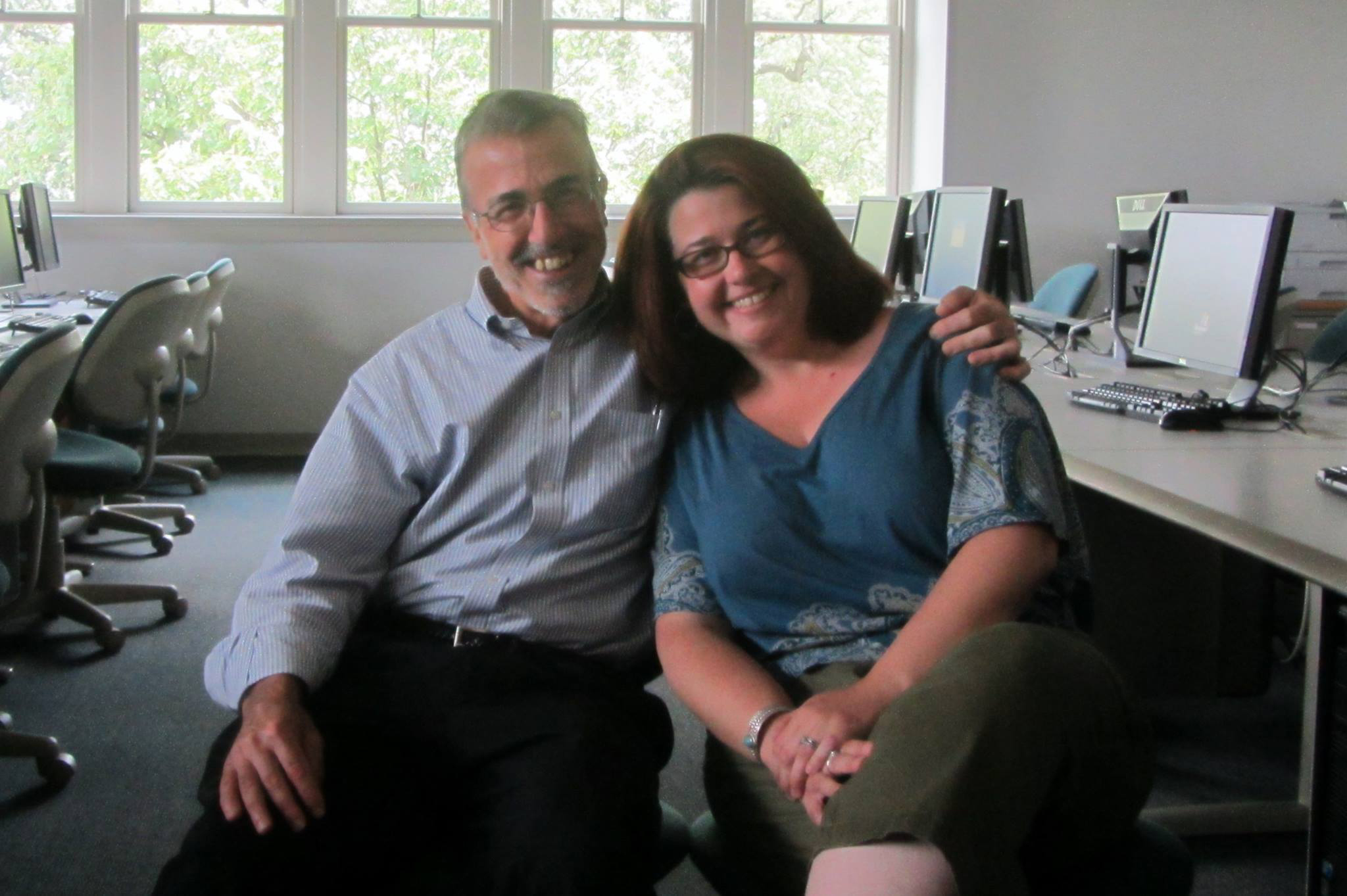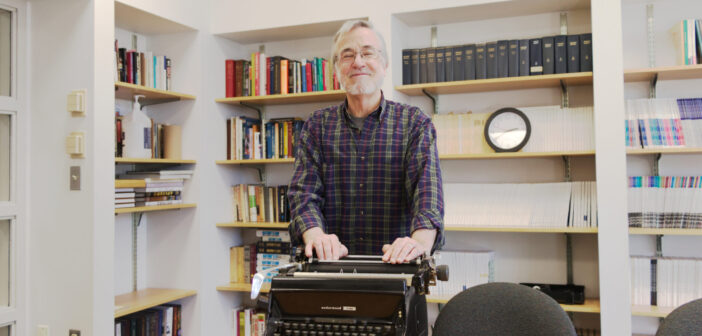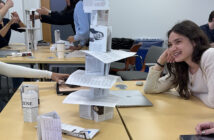Thirty-four years ago, with a 32-ounce tumbler of piping hot black coffee in hand, Jack Lule strolled into his first-ever class at Lehigh in the basement of the Clayton University Center.
Running his hands through his long hair, the journalism department’s newest professor told his students to bear with him as he took a few more swigs and let the caffeine kick in before starting the class.
He admitted to his students that, as the father of two young children, he was tired. But he also made it apparent that a lack of sleep or a busy schedule would not hold him back from sharing his years of knowledge and experience with his class and shaping the department into what it is today.
Lule was hired in 1990 after working for several years as a journalist, author and assistant professor at the University of Tulsa. He was chair of Lehigh’s Department of Journalism and Communications from 1994 to 2002 and again from 2011 to 2020. He also directed the global studies program when it was first developed.
As he looks to spend more time writing his fourth book, traveling the world and spending time with his family, Lule will be retiring after this semester.
Lule was one of six kids growing up and recalls his big family being influential on the type of person he is today.
He studied sociology and psychology at Binghamton University and said he was always writing, but never thought it would translate into a profession. Following graduation, he traveled across the world, and upon his return, decided to take a stab at a career in journalism.
After obtaining a master’s in journalism from Temple University, he began working at the Philadelphia Inquirer. There and during his time as a freelance writer, he created a diverse portfolio.
Though he enjoyed writing in general, he said the “gut-wrenching” news stories he wrote led him to the University of Georgia for his doctorate. In addition to meeting his wife there, he worked on a dissertation comparing news stories and mythological stories, which he later turned into his first book, Daily News, Eternal Stories: The Mythological Role of Journalism.
He has since published two more books, Globalization and Media: Global Village of Babel and Understanding Media and Culture, and is currently editing a fourth about scapegoating and global media. He said as his career progressed and his passions expanded, so did the topics he wrote about.
“It’s interesting how the books have kind of followed my trajectory,” Lule said.
John Vilanova, a professor of journalism and Africana studies at Lehigh, said Lule is important in the journalism field, and his books are influential.
When Lule was publishing one of his books, he chose a publisher that he knew would print the book in a way that was financially accessible to students.
“There’s a high degree of thoughtfulness behind every decision that is ultimately really strategic and ultimately places at the forefront his ability to serve the needs of the people in our community,” Vilanova said.
While writing these books, Lule settled in North Bethlehem to raise his family and work at the university, shaping the culture of the journalism department and the attitudes of many students.
“I recognized right away the strengths of Lehigh,” Lule said. “The small class sizes and the ability to not be overwhelmed with the number of classes that you’re teaching allows you to really put your time into teaching.”
Jonathan Green, ‘92, was a journalism major and a member of Lule’s first class at Lehigh. He said from the moment Lule walked in on the first day, it was established that the class was a community.
“It was just such a refreshing breath of air that a professor would come in and be that down to earth and almost consider his students as equals,” Green said.
Green said Lule has “always been true to himself” and is “very confident in who he is.”
Lule’s self-assuredness allowed students to relax and be themselves in the classroom. For Green, he said this enabled him to be more confident and ultimately more successful.
“(Communications students) need to be in an environment where they can foster and promote those skill sets,” Green said. “And (Lule), from day one, had set the stage and set the tone in his classrooms to allow people to be themselves.”
Beth-Anne Guthrie, ‘94, was also one of Lule’s first students at Lehigh. As a journalism and English major, she took several classes with him and worked with him on The Brown and White, and recognized the care that Lule put into every facet of his work.

Professor Jack Lule poses with his former student Beth-Anne Guthrie ‘94 in Coppee Hall. Lule first began working at Lehigh in 1990 and will be retiring at the end of this semester. (Courtesy of Jack Lule)
Guthrie even took a sports writing class with Lule one summer despite knowing nothing about athletics. She said she thought he was such an exceptional educator that she wanted to take anything he was teaching.
She also said Lule’s classes were the furthest thing from typical lectures. Instead, Guthrie said, he treated his students like adults, sought out their opinions and wanted to hear them aloud in class.
Lule said the power of a voice was something he always tried to teach. As a journalist himself, he said he thought about things in the first person and tried to keep his voice present in his work, as the privilege of journalism is getting to tell other people’s stories.
“Something that’s run through my whole time, in terms of writing, research and teaching, is the power of storytelling, and I don’t think we’re ever going to lose that as humans,” Lule said. “That’s how people learn, that’s how people pass on their values to one another, that’s how you train children through stories.”
Guthrie now works as the Associate Director for Advocacy and Education at the University of Massachusetts Dartmouth. She said she was drawn to work in higher education with young adults because Lule made such a huge impact on her life and she wanted to perhaps be that person for somebody else.
Gili Remen, ‘19, a double major in journalism and global studies with a business minor, studied with Lule much further into his career. Since college, she’s worked in various positions at CNN and is now getting her master’s degree at Tel Aviv University while continuing to work as a journalist in the Middle East and as a producer for the “Unholy” podcast.
She said she came to Lehigh on the pre-med track, but after contemplating her desire to become a doctor, she ended up in Lule’s office discussing journalism.
“I could just feel how good his energy was,” Remen said. “I just walked out of there being like, ‘Okay, that was confirmation for me that this is the right person, and this is the right department, and this is the right program.’ And I literally left his office and never looked back.”
Remen said the environment Lule creates in his classes is one where students feel constantly supported and comfortable enough to ask anything.
She also said she recalls having fun in his classes and referred to Lule as “smiley,” “uplifting” and “energetic.”
Remen participated in two study abroad programs led by Lule, both of which helped her get to know him more as a person. She said he’s an easy person to connect with.
Lule also played a role in his colleagues’ professional development. Vilanova said Lule took him on a driving tour of Bethlehem during his campus visit in 2008, and it was immediately clear to him that Lule was someone he wanted to work for.
He said the trait of Lule’s that he thinks will be most remembered by his colleagues and students is that he’s a deeply kind person.
“That kindness radiates from him,” he said. “He extends it to all people, big and small, young and old, established and starting out, and that kindness and warmth is eternal.”
He said this kindness played a role in forming the journalism department and will continue to inform its culture.
“It informs the way that we think about teaching and how we relate to our students and to each other,” Vilanova said. “I think that a department led by him (puts) people first, and that is a real and true legacy that he will have left in this building absolutely and over at the UC as well.”
Jeremy Littau, a professor of journalism at Lehigh, met Lule at a conference in 2008 when he was on the job market as a PhD student. He said he met with many potential employers at the conference, but his 30-minute-turned-hour-long conversation with Lule sparked his interest in working at Lehigh.
Littau said the two hit it off immediately, as they connected on common interests and passions. But the main thing that struck him was that Lule was a genuine person who took a genuine interest in what he had to say.
He said nobody else at the conference made him feel like they were really listening to him the way Lule did, and he knew then and there that if Lehigh was half the place Lule described, he wanted to be a part of it.
“It was always my first choice because of him,” Littau said.
Nothing is more important to Lule than his family, and Littau said he’s a prime example of the balance between that and his work. He said in academia, he finds it’s often implied that one should be working all the time, but he’s witnessed numerous occasions when Lule made it clear he should prioritize his family, health, mental health, or self-care.
“To say that out loud and say it unflinchingly is a really, really rare thing,” Littau said.
Green said he believes Lule was one of the leading educators in implementing his teaching style, which has since been adopted by many other professors. One of the most impactful parts of Lule’s teaching philosophy, he said, is empathy.
“He was really patient with me, as I’m sure he has been since with a number of his students,” he said. “(Lule) took in a lost person and set me on a course that enabled me to find my strengths and then excel as a student and subsequently as a person in the community.”
Guthrie echoed the same sentiment and said Lule never failed to demonstrate care for his students inside and outside the classroom. This people-first approach is something that stuck with her years after having Lule as a professor.
Since graduating from Lehigh, Guthrie has honored Lule in many ways, from her family to her work to her personal life.
She remained connected to him through social media. The two have exchanged holiday cards, and she even named one of her children’s middle names after him.
She said, to this day, when she’s feeling stuck or conflicted in her work, she asks herself, “What would Jack do?”
Years after graduating from Lehigh, Guthrie and other alumni were allowed to submit to Lehigh’s Alumni Magazine for a series of columns called “the professor that changed my life.” She said she immediately knew she wanted to participate and exactly what she wanted to say.
Guthrie wrote that Lule saved her life when she was a student of his — her way of communicating his significance to the Lehigh community and telling Lule the full impact he had on her for the first time.
She said she became deeply depressed and suicidal during her sophomore year, and Lule recognized that. He then asked her to speak with him outside of class and connected her with resources to help her mental health.
“I really credit him with saving my life,” Guthrie said. “I have this indelible and endearing connection to him, as somebody who was a faculty member, as somebody who was my mentor and somebody who really demonstrated concern for me at a time that I needed it.”
Lule’s support, Guthrie said, enabled her to continue her career at Lehigh and be successful.
As a professor, Littau said he’s noticed Lule’s ability to make his students feel as though they can accomplish anything, and he thinks Lule prepares his students for the rest of their lives.
He said though Lule is a kind person, he pushes his students, is an active listener and always provides constructive feedback.
“(It was) the first time I can remember where a professor actually took enough interest in me as a student, to not only say, ‘Here’s the path you should go on, here’s the strengths you should lean into,’ but also, ‘Don’t try to BS me, because that’s not going to fly,’” Green said.
He also said Lule is great at weaving real-world examples into his lessons.
Littau said he’s altered his teaching style to gear it more toward Lule’s, and he’s learned a lot from watching Lule outside of the classroom. In particular, he said Lule taught him how to play the long game to accomplish his goals and that the relationships built at Lehigh are important for doing so.
“He’s the best I’ve ever seen at (making) everybody who has a seat at the table for a decision feel like they had a voice and that they’re getting something out of it,” Littau said.
In every conversation the two have had about Littau’s work, Littau said he feels that Lule wants to understand his goals to ensure he’s equipped to help.
“A really important secret sauce for (Lule) is that he really does love what you do, and he really takes a genuine interest in it,” Littau said.
To Lule, he said, “the work matters less than the person.”
When Lule joined the journalism department, it was much smaller than it is now. Lule made the invaluable nature of the skillset students learn while studying communications evident to the university, which Green said helped the department get funding to expand the program.
He said Lule was able to “resurrect” the department and was “instrumental” in making it what it is today.
Lule said he spearheaded a fundraising campaign while he was chair that provided an endowment to keep The Brown and White going.
“You look around the world and you see how newspapers are dying everywhere,” Lule said. “But The Brown and White is such an important vehicle for us that I thought we needed a way to keep it going.”
As chair of the department, Littau said Lule worked hard and was tired, but he never uttered a word of anything but gratitude for what he got to do every day.
He said with a lot of planning, travel and meetings, Lule raised several million dollars for the department and The Brown and White.
“(He) solidified our future for, I would say, the next 30 to 40 years,” Littau said. “We’re in great financial shape as a department because of his efforts there.”
Vilanova said he turns to Lule all the time, and he plans to continue doing so in the future.
“He reads our work like he treats us as people — with attention, sincerity, respect and kindness,” Vilanova said.
Vilanova also said he thinks people oftentimes don’t realize the impact on multiple fields Lule had before he came to Lehigh, and he’s more than just a professor.
For example, Vilanova said Lule worked as a music critic during key points in the history of American culture, and now the two often talk about music, which serves as the bridge between his research and the two professors’ personal interests.
“He has all of these interests that make him more than his scholarship,” Vilanova said. “His scholarly imprint is significant and vast, but ultimately, at the end of the day, I think that is rivaled by his impact as a colleague, teacher and member of this university community.”
Lule said retiring wasn’t an easy decision, but the knowledge that he has 34 years of students he can remain in contact with has made it easier.
“The way I’ve sort of rationalized it is that I’ll still have students that I’ll be in touch with from all those years,” he said. “You wouldn’t last 34 years as a professor if you didn’t really enjoy being around students… Lehigh has really made it easy to have relationships with students and keep those relationships going through the years.”
Looking back, Lule said he was able to accomplish everything he wanted and more — in his personal and professional life — and now he’s ready for the next chapter.
“It’s an interesting thing to look back and think, ‘I don’t have any regrets,’” he said.






Comment policy
Comments posted to The Brown and White website are reviewed by a moderator before being approved. Incendiary speech or harassing language, including comments targeted at individuals, may be deemed unacceptable and not published. Spam and other soliciting will also be declined.
The Brown and White also reserves the right to not publish entirely anonymous comments.
2 Comments
My first semester at Lehigh in 2012, I took intro to Global Studies with Prof. Jack Lule, and I still think about it all the time. Wonderful professor and well-earned accolades. Hats off!
Congratulations to Prof. Jack Lule! Prof. Lule inspired me to add a major in Global Studies during my Freshman year in Spring 2009, and that decision put my life and career on a trajectory I never could have imagined. Thank you, Prof. Lule! You’ve made an incredible mark in the lives of your students and the world.